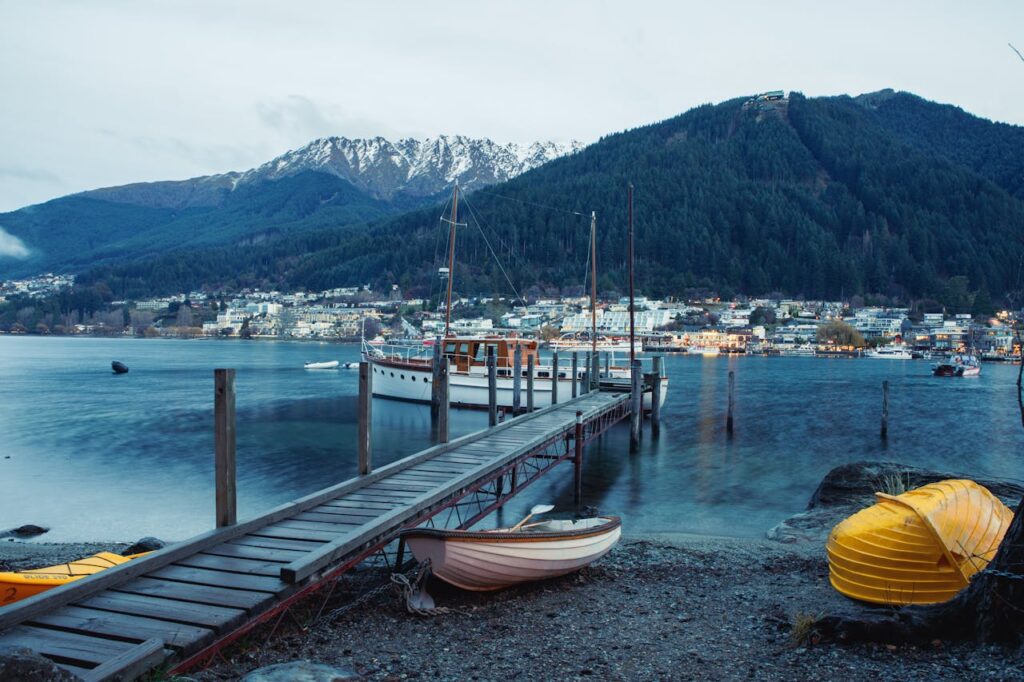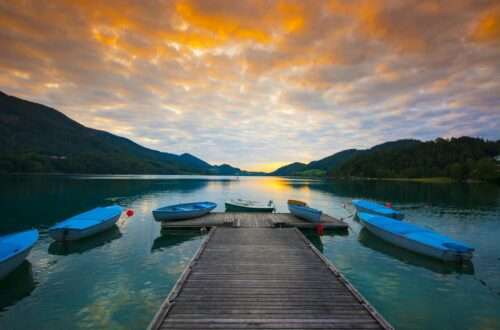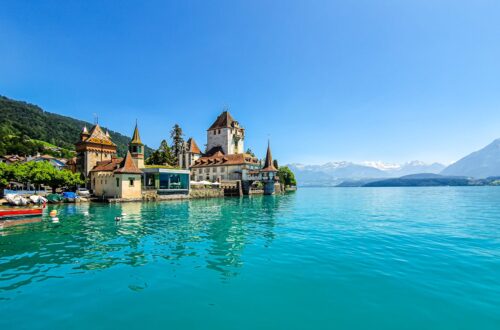
Eco-Friendly Travel Destinations You Need to Visit This Year
Are you someone who loves traveling and wants to make a positive difference in the world? Well, listen up because there’s a cool new trend you’ll want to know about! More and more travelers are now choosing to explore amazing places while also helping to protect them for the future. It’s not just about taking awesome photos for Instagram anymore – it’s about experiencing stunning landscapes and cultures while making sure they stay beautiful for generations to come.
If you’re up for an eco-friendly adventure this year, get excited! Grab your bags (make sure they’re eco-friendly too!) andlet’s go explore some awesome places that are really good at taking care of the Earth.
The Concept of Eco-Friendly Tourism
Eco-friendly tourism, also known as sustainable tourism or responsible tourism, refers to traveling in a way that minimizes negative impacts on the environment, supports local communities, and promotes conservation efforts. It involves making conscious choices to reduce carbon footprint, conserve natural resources, and respect local cultures and traditions.
Eco-friendly tourists often opt for activities such as hiking, wildlife watching, and staying in eco-lodges or accommodations certified for their environmental practices. Eco-tourism is all about traveling responsibly. It’s about choosing destinations that prioritize conservation, supporting local communities, and minimizing your carbon footprint. Lets discuss some of incredible places that embody this philosophy:
1. Costa Rica: A Paradise of Rainforests and Renewables
Costa Rica, often referred to as the “Pura Vida Paradise,” is a haven for nature lovers and adventure seekers alike. Here’s why this Central American gem should be at the top of your travel bucket list:
Dive into Biodiversity:
Costa Rica boasts some of the most diverse ecosystems on the planet, making it a hotspot for eco-tourism. From dense rainforests teeming with exotic wildlife to pristine beaches lined with palm trees, there’s no shortage of natural wonders to explore. Immerse yourself in the lush landscapes and encounter colorful birds, playful monkeys, and elusive big cats on guided nature walks or thrilling canopy tours.
Sustainable Practices:
What sets Costa Rica apart is its commitment to sustainable tourism. The country has earned a reputation as a global leader in eco-friendly initiatives, with eco-lodges, wildlife sanctuaries, and conservation projects scattered throughout the region. Travelers can rest easy knowing that their visit contributes to the preservation of Costa Rica’s precious ecosystems, thanks to initiatives like carbon-neutral transportation and responsible waste management.
Adventure Awaits:
For adrenaline junkies, Costa Rica is a playground of thrilling eco-adventures. Zip-line through the lush canopy for a bird’s eye view of the rainforest, catch Pacific waves on some of the world’s best surfing beaches, or trek up active volcanoes for a once-in-a-lifetime experience. Whether you’re a novice or an experienced outdoor enthusiast, there’s no shortage of heart-pounding activities to get your adrenaline pumping.
Costa Rica’s blend of breathtaking natural beauty, sustainable tourism practices, and thrilling adventures make it a paradise like no other.
2. Norway: Sustainable Exploration of Fjords and Northern Lights
Norway, often hailed as the “Land of Fjords and Sustainability,” boasts a blend of natural splendor and progressive environmental practices that attract travelers from around the globe.
Majestic Fjords:
Norway’s fjords are unparalleled in their grandeur, with steep cliffs plunging into deep, serene waters. These geological wonders provide a breathtaking backdrop for activities such as kayaking, hiking, or simply admiring the scenery. Wildlife thrives in these pristine environments, with opportunities to spot seals, eagles, and even the occasional reindeer along the fjord shores.
Green Innovation:
At the forefront of sustainable living, Norway exemplifies a commitment to renewable energy and eco-conscious infrastructure. Electric ferries silently glide across fjords, reducing emissions and preserving the purity of Norway’s aquatic ecosystems. Innovative architectural designs prioritize energy efficiency and harmony with the surrounding environment, showcasing Norway’s dedication to sustainable living.
Northern Wonders:
Norway’s Arctic region offers a plethora of natural wonders, including the ethereal Northern Lights dancing across the night sky. Visitors can embark on unforgettable whale-watching excursions, encountering majestic creatures like humpback and killer whales in their natural habitat. For those seeking terrestrial adventures, Norway’s national parks beckon with pristine wilderness, inviting exploration through hiking trails that wind past cascading waterfalls and verdant forests.
Norway beckons with the promise of epic adventures. Sail through majestic fjords, witness the ethereal Northern Lights, and experience the wonders of a sustainable Nordic paradise – all this awaits, whatever the season.
3. Bhutan: The Land of Gross National Happiness
Bhutan, often hailed as “The Kingdom of Gross National Happiness,” offers a captivating blend of sustainable serenity, cultural immersion, and trekking bliss. Here’s a glimpse into what makes Bhutan a unique destination:
Sustainable Serenity:
Bhutan’s commitment to environmental conservation is deeply ingrained in its policies and culture. Visitors can experience this ethos firsthand by exploring pristine landscapes, where lush forests, snow-capped peaks, and clear rivers create a sanctuary for both wildlife and humans alike. The country’s emphasis on sustainability ensures that its natural beauty remains preserved for future generations to enjoy.
Cultural Immersion:
Bhutan’s rich cultural heritage is evident in its ancient monasteries, colorful festivals, and traditional way of life. Visitors have the opportunity to immerse themselves in Bhutanese customs and traditions, whether by participating in religious ceremonies, learning traditional arts and crafts, or engaging with local communities. Community-based tourism initiatives offer authentic experiences while supporting the livelihoods of Bhutanese people.
Trekking Bliss:
For outdoor enthusiasts, Bhutan is a paradise waiting to be explored. Trekking routes traverse a diverse terrain, from high-altitude passes in the Himalayas to lush valleys adorned with fluttering prayer flags. Whether embarking on a multi-day trek or a day hike, adventurers are rewarded with breathtaking vistas, encounters with rare wildlife, and a profound sense of tranquility amidst nature’s grandeur. Bhutan’s commitment to sustainable tourism ensures that trekking experiences leave minimal impact on the environment.
Bhutan entices visitors with its perfect balance of stunning nature, rich culture, and exciting adventures. It promises a life-changing experience that rejuvenates the spirit and prioritizes the happiness of both its citizens and the environment.
4. Iceland: Fire, Ice, and Eco-Adventure
Iceland is a land of dramatic contrasts, where fire and ice collide in a stunning display of natural beauty. Nicknamed the “Land of Fire and Ice,” Iceland is home to powerful glaciers, volcanic eruptions, geothermal hot springs, and otherworldly landscapes This is an eco-adventure unlike any other.
Dynamic Landscapes:
Prepare to be awestruck as you traverse Iceland’s diverse terrain, where mighty glaciers meet rugged volcanic landscapes. Witness the raw power of nature as you stand before cascading waterfalls, explore ancient lava fields, and gaze upon the imposing peaks of active volcanoes. Each vista offers a glimpse into the geological forces that have shaped this breathtaking land.
Renewable Energy Hub:
Delve into Iceland’s pioneering efforts in sustainable energy as you discover the innovative use of geothermal and hydroelectric power. Learn how Iceland harnesses the Earth’s natural resources to generate clean energy, reducing its carbon footprint and setting an example for the world. From geothermal heating systems to hydroelectric dams, Iceland’s commitment to sustainability permeates every aspect of daily life.
Elemental Experiences:
Immerse yourself in the elements with a range of thrilling eco-adventures tailored to every interest and ability. Take a rejuvenating dip in a geothermal hot spring, where mineral-rich waters offer relaxation and rejuvenation amidst stunning natural surroundings. Strap on your crampons and embark on a glacier hike, traversing icy crevasses and marveling at ancient ice formations. For the adventurous spirit, Iceland’s rugged terrain offers opportunities for horseback riding, kayaking, and even snorkeling between continental tectonic plates.
Craving peace in nature’s embrace or a heart-pounding adventure? Iceland beckons. Explore a land where sustainability thrives alongside awe-inspiring landscapes. Every encounter is a chance to reconnect with Earth in its most pristine form.
5. New Zealand: Adventure Awaits in a Land of Unspoiled Beauty
New Zealand, also known as Aotearoa in the indigenous Māori language, stands as a beacon of eco-tourism and conservation efforts. Its remarkable natural wonders and dedicated conservationists make it a haven for sustainable exploration.
Natural Wonders:
From the steamy geothermal landscapes of Rotorua to the rugged peaks of Fiordland National Park, New Zealand’s landscapes are a testament to the power and beauty of nature. Visitors can immerse themselves in the tranquility of pristine beaches, ancient forests, and majestic mountains, each offering a unique glimpse into the country’s ecological diversity.
Conservation Crusaders:
At the heart of New Zealand’s environmental ethos are the dedicated individuals and organizations working tirelessly to preserve its delicate ecosystems. From community-led initiatives to government-backed conservation projects, there is a palpable sense of commitment to protecting native flora and fauna. The iconic kiwi bird, with its endearing charm, serves as a symbol of these conservation efforts, with sanctuaries and breeding programs helping to safeguard its future.
Outdoor Adventures:
Adventure-seekers flock to New Zealand’s shores for an array of exhilarating outdoor activities. The world-renowned Milford Track lures hikers with its awe-inspiring scenery, while Abel Tasman National Park invites kayakers to explore its pristine coastline and hidden coves. For those captivated by the cosmos, New Zealand’s Dark Sky Reserves offer unparalleled stargazing opportunities, providing a celestial escape from the modern world.
From thrilling expeditions into the wilderness to peaceful moments in untouched beauty, New Zealand’s eco-tourism will leave you inspired by its natural wonders and dedication to sustainability.
6. The Azores: Island Escape with a Volcanic Twist
Nestled in the heart of the Atlantic Ocean, the Azores archipelago offers travelers a unique blend of dramatic volcanic landscapes, pristine waters, and abundant marine life. This Portuguese gem is a paradise for eco-conscious adventurers seeking unforgettable experiences amidst untouched natural beauty.
Volcanic Landscapes:
The Azores’ rugged terrain is a testament to its volcanic origins, with towering peaks, sprawling calderas, and steaming geysers dotting the landscape. Visitors can embark on exhilarating hikes across volcanic craters, marvel at cascading waterfalls hidden within lush forests, and explore mysterious lava caves formed by ancient eruptions.
Marine Riches:
The waters surrounding the Azores are teeming with life, making it a hotspot for marine enthusiasts. From majestic whales breaching the surface to playful dolphins frolicking in the waves, the Azores offer unparalleled opportunities for whale watching and dolphin encounters. Snorkeling and diving expeditions reveal vibrant coral reefs, underwater caves, and a kaleidoscope of marine species thriving in the crystal-clear depths.
Geothermal Delights:
The Azores are blessed with geothermal hot springs scattered across the islands, providing weary travelers with the perfect opportunity to unwind and rejuvenate. Soaking in these natural thermal pools amidst breathtaking scenery is a cherished pastime, offering relaxation and healing properties believed to be beneficial for both body and mind.
Sustainable Practices:
The Azores are committed to preserving their pristine environment and promoting sustainable tourism practices. From eco-friendly accommodations and locally sourced cuisine to community-led conservation initiatives, the islands prioritize responsible tourism to minimize their environmental impact and safeguard their natural heritage for future generations.
In the Azores, adventure and conservation go hand in hand, offering travelers the chance to immerse themselves in a world of natural wonders while contributing to the preservation of this unique island paradise.
Beyond the Destination: Tips for Eco-Friendly Travel
With growing awareness of climate change, pollution, and other environmental issues, many people are seeking ways to minimize their carbon footprint, including in their travel choices. Eco-conscious travelers go beyond just choosing a destination; they consider every aspect of their journey to minimize their environmental footprint and support sustainable practices. Here are some tips to help you travel more sustainably:
Choose Sustainable Transportation: Opt for airlines that prioritize fuel efficiency and carbon offset programs. If possible, consider alternatives like train travel, which can be not only scenic but also more environmentally friendly. For shorter distances, cycling or walking can be fantastic options to reduce carbon emissions.
Minimize Waste: Beyond packing reusable items like water bottles and cutlery, also think about reducing packaging waste by choosing products with minimal or biodegradable packaging. Refuse single-use plastics whenever possible and support businesses that offer eco-friendly alternatives.
Support Eco-Friendly Accommodation: Look for accommodations certified by eco-labels like Green Key or LEED that implement sustainable practices such as energy-efficient lighting, water conservation measures, and waste recycling programs. Additionally, consider options like eco-lodges, farm stays, or homestays that offer a more immersive and sustainable experience.
Respect Local Culture and Environment: Before your trip, take the time to learn about the local customs, traditions, and environmental challenges of your destination. Respect wildlife by observing from a distance and never participating in activities that exploit animals for entertainment. Dispose of waste properly and consider participating in community cleanup efforts if available.
Practice Responsible Tourism: Instead of following the typical tourist routes, seek out off-the-beaten-path destinations or lesser-known attractions. This not only reduces the strain on popular tourist spots but also allows you to discover hidden gems and support local communities that may not benefit from mass tourism.
Offset Your Carbon Footprint: Consider offsetting the carbon emissions from your travels by investing in verified carbon offset projects. These projects can include reforestation efforts, renewable energy initiatives, or community-based projects that help reduce greenhouse gas emissions.
Engage in Sustainable Activities: Choose activities that promote sustainability and cultural exchange, such as hiking, birdwatching, or visiting local markets. Support tour operators and guides who prioritize responsible tourism practices and contribute to the local economy in a positive way.
Dispose of Waste Properly: Dispose of waste responsibly by recycling, composting, or using designated waste disposal facilities. Avoid littering and respect local waste management regulations.
Educate Yourself: Learn about the environmental and cultural significance of the destinations you visit. Engage with local guides, conservation organizations, or indigenous communities to gain insights into their conservation efforts and traditional knowledge.
Conclusion
As we wrap up our tour of these awesome eco-friendly travel spots, it’s essential to keep in mind the impact we leave behind. Every trip we take can make a real difference for our planet. When we pick eco-friendly ways to travel, help local conservation projects, and use eco-friendly habits, we keep nature safe for the future.
You don’t have to limit your adventures when you travel responsibly. With a little planning, you can explore the world while making memories that’ll stick with us forever. So, pack your bags, choose an eco-friendly destination, and get ready for an unforgettable journey! Happy travels!


You May Also Like

Deck the World: Christmas Travel Tips and Destinations
20 December 2024
Sands of Serenity: Unveiling The 5 Best Beaches In India
3 April 2024
